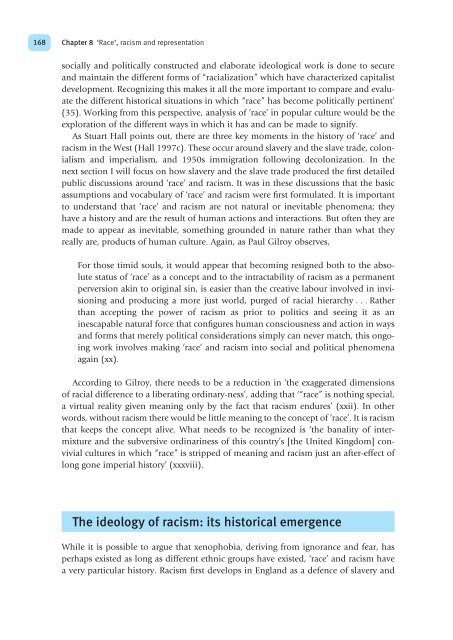Cultural Theory and Popular Culture
Cultural Theory and Popular Culture
Cultural Theory and Popular Culture
Create successful ePaper yourself
Turn your PDF publications into a flip-book with our unique Google optimized e-Paper software.
168<br />
Chapter 8 ‘Race’, racism <strong>and</strong> representation<br />
socially <strong>and</strong> politically constructed <strong>and</strong> elaborate ideological work is done to secure<br />
<strong>and</strong> maintain the different forms of “racialization” which have characterized capitalist<br />
development. Recognizing this makes it all the more important to compare <strong>and</strong> evaluate<br />
the different historical situations in which “race” has become politically pertinent’<br />
(35). Working from this perspective, analysis of ‘race’ in popular culture would be the<br />
exploration of the different ways in which it has <strong>and</strong> can be made to signify.<br />
As Stuart Hall points out, there are three key moments in the history of ‘race’ <strong>and</strong><br />
racism in the West (Hall 1997c). These occur around slavery <strong>and</strong> the slave trade, colonialism<br />
<strong>and</strong> imperialism, <strong>and</strong> 1950s immigration following decolonization. In the<br />
next section I will focus on how slavery <strong>and</strong> the slave trade produced the first detailed<br />
public discussions around ‘race’ <strong>and</strong> racism. It was in these discussions that the basic<br />
assumptions <strong>and</strong> vocabulary of ‘race’ <strong>and</strong> racism were first formulated. It is important<br />
to underst<strong>and</strong> that ‘race’ <strong>and</strong> racism are not natural or inevitable phenomena; they<br />
have a history <strong>and</strong> are the result of human actions <strong>and</strong> interactions. But often they are<br />
made to appear as inevitable, something grounded in nature rather than what they<br />
really are, products of human culture. Again, as Paul Gilroy observes,<br />
For those timid souls, it would appear that becoming resigned both to the absolute<br />
status of ‘race’ as a concept <strong>and</strong> to the intractability of racism as a permanent<br />
perversion akin to original sin, is easier than the creative labour involved in invisioning<br />
<strong>and</strong> producing a more just world, purged of racial hierarchy . . . Rather<br />
than accepting the power of racism as prior to politics <strong>and</strong> seeing it as an<br />
inescapable natural force that configures human consciousness <strong>and</strong> action in ways<br />
<strong>and</strong> forms that merely political considerations simply can never match, this ongoing<br />
work involves making ‘race’ <strong>and</strong> racism into social <strong>and</strong> political phenomena<br />
again (xx).<br />
According to Gilroy, there needs to be a reduction in ‘the exaggerated dimensions<br />
of racial difference to a liberating ordinary-ness’, adding that ‘“race” is nothing special,<br />
a virtual reality given meaning only by the fact that racism endures’ (xxii). In other<br />
words, without racism there would be little meaning to the concept of ‘race’. It is racism<br />
that keeps the concept alive. What needs to be recognized is ‘the banality of intermixture<br />
<strong>and</strong> the subversive ordinariness of this country’s [the United Kingdom] convivial<br />
cultures in which “race” is stripped of meaning <strong>and</strong> racism just an after-effect of<br />
long gone imperial history’ (xxxviii).<br />
The ideology of racism: its historical emergence<br />
While it is possible to argue that xenophobia, deriving from ignorance <strong>and</strong> fear, has<br />
perhaps existed as long as different ethnic groups have existed, ‘race’ <strong>and</strong> racism have<br />
a very particular history. Racism first develops in Engl<strong>and</strong> as a defence of slavery <strong>and</strong>
















